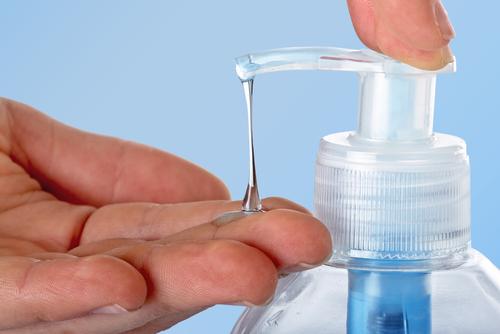
Antibacterial Soaps Linked to Endocrine Disruption, Allergies, Immune Dysfunction and More
As the country gears up for cold and flu season, consumers can expect to see ads and shop displays featuring antibacterial soaps. These soaps allegedly stave off illness and kill "up to 99.9% of bacteria." But what many people don't realize is that these ubiquitous "germ-killing" products pose some surprising dangers to human health.
We looked into the research about the dangers of antibacterial soaps and explain why many health experts and organizations advise against these popular skin care products.
5 Surprising Problems With Antibacterial Soap
1. Antibacterial soaps may disrupt endocrine function.
At least two studies, including a 2008 study published in Toxicological Sciences and a 2006 study published in Aquatic Toxicology, have found that an active compound in antibacterial soap called triclosan negatively modulates thyroid hormone production in rats and frogs.
This endocrine-disrupting effect has yet to be specifically studied in humans, but we know that this type of hormone dysfunction, if present, could contribute to issues like artificially-advanced early puberty, obesity, cancer, and infertility.
2. Use of antibacterial soap may increase the risk for allergies and immune dysfunction.
One way an immune system becomes fully developed is by being exposed to (and subsequently creating antibodies against) bacteria. Many scientists theorize that "over-protecting" children from bacteria by inundating them with antibacterial soaps may contribute to the rising prevalence of immune-related health issues. This is often described as the "hygienic hypothesis."
This hypothesis is well-supported by scientific data. As an example, data published in a 2013 paper from the Journal of Allergy and Clinical Immunology suggests that exposure to triclosan may trigger food sensitivities and peanut allergy. Another 2012 study published in Environmental Health Perspectives involving 3,728 participants found that having higher levels of triclosan in urine was positively correlated with an increased risk of hay fever.
And since triclosan mimics estrogen, experts believe the popular antibacterial soap ingredient may also have a more direct influence on immune function beyond just the "hygienic hypothesis."
3. Use of antibacterial soap may contribute to the rise of dangerous "superbugs."
Drug-resistance organisms are considered by the World Health Organization as major threats to public health because they could lead to dangerous, widespread, and difficult-to-treat infections. And while further research is necessary, some evidence, including a 2006 review published in Microbial Drug Resistance, suggests that the overwhelming use of triclosan containing antibacterial soap may contribute to this rising global threat.
4. Antibacterial soaps are damaging to the environment.
It's well-established that antibacterial chemicals like triclosan can bioaccumulate in human fat, urine, blood, and other tissues. Additionally, soap by its very design gets directly into our sewage system and can survive wastewater treatment. So it's no surprise to learn that chemicals from antibacterial soap are routinely found in bodies of water as well as the animals and plants living in them.
For example, Environmental Pollution published in a study in 2009 showing that wild Atlantic bottlenose dolphins had bioaccumulated triclosan in their blood. And the same 2010 study from Aquatic Toxicology that showed triclosan can survive wastewater treatment also found that "photosynthetic efficiency [of algae] was inhibited with increasing triclosan concentrations."
5. Antibacterial soaps don't work better than regular soap.
Based on over four decades of research, the Food and Drug Administration (FDA) conclude that antibacterial soaps are no more effective for stopping the spread of germs and preventing illness compared to conventional soap and water! The FDA also warns that the safety of triclosan and other antibacterial agents haven't been proven.
And as you might imagine by now, it's not just antibacterial soaps that pose problematic to human health.
A 2014 study published in PLOS One found that people who handle store receipts right after using hand sanitizer increase their exposure to BPA, an environmental contaminant and known endocrine-disruptor used mostly in food and beverage packaging (as well as thermal-printed receipts). The reason? Hand sanitizers contain chemicals that enhance the penetration of compounds like BPA by up to 100-fold!
Conclusion
Proper hand hygiene is certainly important for avoiding illnesses and staying healthier during cold and flu season. But there's no research indicating that you need antibacterial soaps to do the job. In fact, these types of soaps may damage human health rather than protect it.
Natural hand soaps made with human- and earth-friendly ingredients (in addition to other lifestyle habits like proper sleep, nutrition, and reduction of environmental toxin exposure) should be effective enough for keeping you and your family healthier throughout the year.
inspiration: https://www.smithsonianmag.com/science-nature/five-reasons-why-you-should-probably-stop-using-antibacterial-soap-180948078/
https://www.ncbi.nlm.nih.gov/pmc/articles/PMC4206219/
https://www.ncbi.nlm.nih.gov/pubmed/19410343
https://www.fda.gov/consumers/consumer-updates/antibacterial-soap-you-can-skip-it-use-plain-soap-and-water
https://www.sciencedirect.com/science/article/abs/pii/S0166445X06003407
https://pubs.usgs.gov/fs/2004/3127/
https://www.ncbi.nlm.nih.gov/pubmed/16922622
https://www.ncbi.nlm.nih.gov/pmc/articles/PMC3060004/
http://www.who.int/drugresistance/stag/en/index.html
https://www.sciencedirect.com/science/article/abs/pii/S0091674912017824
https://academic.oup.com/toxsci/article/107/1/56/1664314





.png?v=14052428765372906161761701960) Previous Post
Previous Post
%20copy.png?v=62173825240595680121761701960)